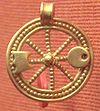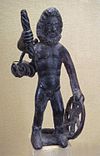- Cicolluis
-
Cicolluis or Cicoluis (also known as Cicollus, Cicolus, Cicollui, and Cichol) is a god in Celtic mythology worshiped by the ancient Gaulish peoples and having a parallel in Ireland. The name is Gaulish and means “All-Breast” or “Great-Breasted” and is probably used to signify strength. In the Gallo-Roman religion, Cicolluis is thought to be a common epithet for Gaulish Mars.[1] A Latin dedicatory inscription from Narbonne (which was in the far south of Gaul), France, bears the words MARTI CICOLLUI ET LITAVI (“Mars Cicolluis and Litavis”).[2],[3] “Mars Cicolluis” has dedications in Xanten, Germany, and Aignay-le-Duc (where his consort is given as Litavis) and Mâlain (where his consorts are given as Litavis and Bellona, Roman goddess and personification of war) of the Côte-d'Or, France. “Cicolluis” is named alone (not as an epithet of Mars) in an inscription at Chassey, Côte-d'Or, Franche-Comté, France, and a partial inscription from Ruffey-lès-Echirey, Côte-d'Or, France, may be dedicated to Cicolluis. In Windisch, Switzerland, he is known as “Cicollus,” and in Dijon, Côte-d'Or, France, he is known as “Mars Cicoluis.”[1]
Cicolluis may also be identified with Cichol or Cíocal Gricenchos, the earliest-mentioned leader of the Fomorians or Fomóiri (the semi-divine initial inhabitants of Ireland) in Irish mythology. According to the seventeenth-century Irish historian Seathrún Céitinn (also known by the English name Geoffrey Keating), Cichol arrived in Ireland with fifty men and fifty women on six boats a hundred years after the Flood. There, his people lived on fish and fowl for two hundred years until Partholón and his people (who brought the plough and oxen) invaded and defeated the Fomorians in the Battle of Magh Ithe.[1]
Cicolluis’s name is most likely derived from the reconstructed proto-Celtic roots *k-kƒ[1] (“breast,” but also yields the insular Celtic words for “meat,”[1] such as Irish cich [“flesh”][3]), Welsh cig [“meat/flesh”] and *olyo- (“all,” “whole,” or “every”); this leads to the translation “All-Breast” or “Great-Breasted.” This likely epithet for strength might relate with Cichol as leader of the Fomorians. Therefore, Cicolluis may have been identified with the warrior aspect of Roman Mars and may have been a protective deity.[1]
References
- ^ a b c d e f Evans, Dyfed Lloyd. “Cicolluis: A Gaulish and Irish God, Also Known as Cicollus, Cicolus, Cichol (Great-Breasted).” Celtnet: Nemeton. 22 May 2007 <http://www.celtnet.org.uk/gods_c/cicolluis.html>.
- ^ Koch, John T. “Ériu, Alba, and Letha: When Was a Language Ancestral to Gaelic First Spoken in Ireland?” Emania: Bulletin of the Navan Research Group 9 (1991): 17–27.
- ^ a b Gwinn, Christopher. “Re: Litavi.” LISTSERV 15.0: OLD-IRISH-L Archives. 31 Dec. 2000, 13:48:19 −0500. L-Soft. 22 May 2007 <https://listserv.heanet.ie/cgi-bin/wa?A2=ind0012&L=old-irish-l&P=10754>.
External links
- A section of the Lebor Gabála Érenn relating to Ciccul Gricenchoss and its translation into English by Jonathan Slocum, Patrizia de Bernardo Stempel, and Caren Esser
- Etymological translations of “Cicolluis,” “Cicollus,” “Cicos,” etc. by Patrick Cuadrado (in French); automatic Google translation into English
Celtic mythology series Supra-regional Alaunus • Alisanos • Andarta • Anextiomarus • Artio • Aveta • Belenus • Belisama • Borvo • Brigantia • Camulus • Cernunnos • Cicolluis • Cissonius • Condatis • Damona • Matrona • Dis Pater • Epona • Erecura • Esus • Genii Cucullati • Grannus • Ialonus Contrebis • Lenus • Litavis • Loucetios • Lugus • Maponos • Matres • Mogons • Nantosuelta • Ogmios • Rosmerta • Segomo • Sirona • Sucellus • Suleviae • Taranis • Toutatis • Virotutis • VisuciusBritannia Gallia Aquitania Gallia Belgica Abnoba • Ancamna • Arduinna • Arvernus • Icovellauna • Inciona • Intarabus • Iovantucarus • Ritona • Veraudunus • Vindonnus • Vosegus • XulsigiaeGallia Celtica Gallia Cisalpina Gallia Narbonensis Germania Inferior Gallaecia Categories:- Ancient Gaulish and British gods
- Gallo-Roman religion
- Irish gods
- Tutelary
- War gods
Wikimedia Foundation. 2010.


